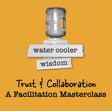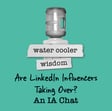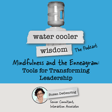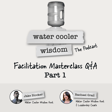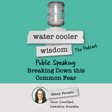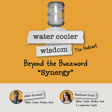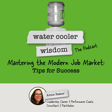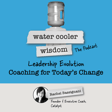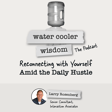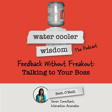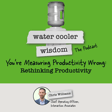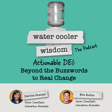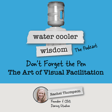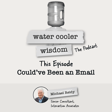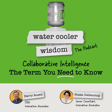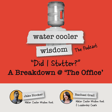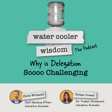Become a Creator today!Start creating today - Share your story with the world!
Start for free
00:00:00
00:00:01

Leadership In Motion: The Power of Attention Agility
In this episode of Water Cooler Wisdom, we welcome Jay Cone and Lisa Weaver, co-founders of Unstuck Minds, to explore the essential leadership skill of Attention Agility.
Jay and Lisa bring their extensive experience in organizational change and executive coaching to discuss how leaders can adeptly navigate complex and uncertain environments. Learn about the SCAN framework, designed to enhance decision-making and strategic thinking by broadening leaders' perspectives beyond conventional approaches.
This discussion is packed with actionable insights for anyone looking to lead more effectively in today’s dynamic world.
References in this Episode:
Pi.ai (link)
Synchronicity - Joseph Jaworski (link)
Man Search for Meaning - Viktor E. Frankl (link)
Transcript
Effective Leadership in Crisis
00:00:06
Speaker
Part of the territory as a leader seems to be having your attention pulled in 150 different directions on any given day. But how can leaders effectively pivot without feeling like they're simply chasing the latest emergency that landed in their inbox?
Meet the Experts: Jay Cohn and Lisa Weaver
00:00:21
Speaker
On today's episode of Watercooler Wisdom, we'll be joined by Jay Cohn and Lisa Weaver from Unstuck Minds, who will discuss Attention Agility, a vital skill for leaders to navigate the demands of their roles
00:00:34
Speaker
without being overwhelmed by the urgency of the moment.
Creativity in Leadership
00:00:40
Speaker
Welcome to another episode of Water Cooler Wisdom. I'm Rachel Grail. And I am Jake Blocker. Jake, do you ever feel like there's gotta be a better way when you're doing something or like there must be a creative solution if only you could just think of it and why can't you think of it? Yes, yes, I feel like that's just part of my job in marketing.
00:01:05
Speaker
That's in the job description of marketing leaders. You're constantly trying to find different creative solutions and racking your brain of like, why can't this be easier? Right. Why can't this be easier? I mean, I think that's totally makes sense to be in your job description. It's sort of like in the job description of life as well.
Introduction to Attention Agility
00:01:25
Speaker
It's just like we get stuck in these patterns of thinking and it's hard to get unstuck.
00:01:31
Speaker
And that's definitely, I think, one of the things that I seek support around. We're all about gathering around the imaginary water cooler. And today we have two guests who have an incredible framework to help us get unstuck in our thinking and to create more attention agility. So I'm excited to get into it. I think it's gonna be a great conversation. Are you ready to bring our guests on?
00:01:58
Speaker
I am ready. Let's do it. All right. Let's go. I am delighted to welcome our two guests today. I've been really looking forward to this conversation. So let me tell you who's with us. We have Jay Cohn, the co-founder of Unstuck Minds, who brings over three decades of experience in leadership development and organizational change. Former adjunct faculty at the University of Texas at Dallas, Jay has worked globally with prominent public and private organizations.
00:02:27
Speaker
helping executive teams and leaders navigate uncertainty and design creative solutions. His insights on leadership have been featured in esteemed publications like Training Magazine and Rotman Management Magazine. An accomplished author, Jay's latest book, The Surprising Power of Not Knowing What to Do,
00:02:48
Speaker
has garnered critical acclaim. With a client roster, including industry giants like Dell Technologies and Floor, Jay continues to empower leaders to break free from limiting thinking patterns. Based in Dallas, Texas, Jay enjoys family life with his wife, Catherine, and their three adult daughters.
Defining Attention Agility
00:03:06
Speaker
Welcome, Jay. Thank you, Rachels. Great to be here.
00:03:09
Speaker
Great to have you with us. And Lisa Weaver. Lisa Weaver is the co-founder of Unstuck Minds, who brings over two decades of experience collaborating with clients across diverse industries. As a business development enthusiast and executive coach, she's passionate about understanding clients' needs and co-creating innovative solutions and strategies to address their challenges.
00:03:34
Speaker
Leading Unstuck Minds' business development initiatives and executive coaching practice, Lisa empowers clients to unlock hidden insights and achieve transformative breakthroughs. Committed to community impact, Lisa has served on various nonprofit boards and holds a BA in business from Indiana University's Kelly School of Business.
00:03:55
Speaker
Based in Dallas with her husband and two young boys, Lisa cultivates meaningful connections both personally and professionally, boasting a client roster, including prominent organizations like Abbott, Dell, and Novartis. Welcome, Lisa. Hi, thanks for having me. Thank you for being here.
00:04:15
Speaker
Yeah, I think about this. I'm looking forward to this
Exploring the SCAN Framework
00:04:17
Speaker
conversation. I'm going to frame this up just a little bit for us. So for today, for leaders, part of our job seems to be having our attention pulled in really a million different directions at any given time.
00:04:29
Speaker
And really, it's part of the territory as a leader. But just because you're technically moving your attention doesn't mean it's being done well. So that's where Attention Agility comes into play. And Jay, I know you wrote a great article on this recently, and I'm looking forward to digging into this a bit more. So Jay and Lisa, I'd love for you to go into a little bit more detail on this term and what it means for today's leaders. Yeah, let me start, Jay.
00:04:57
Speaker
Attention agility, we think is a critical skill. We define it as a capacity to shift your focus quickly and easily when dealing with the dynamics of complexity and uncertainty. And maybe the easiest way to understand it that people can identify with is, you know, if you're driving a car and conditions are normal and predictable and familiar,
00:05:22
Speaker
You have a lot of attention to spare. You can have a conversation. You can be listening to a podcast, but when the conditions change, we know that suddenly our attention is required and we have to focus differently. And our belief is that just like those driving conditions, conditions for leaders and organizations have gotten more hazardous and more unpredictable. And so.
00:05:50
Speaker
leaders also need to shift their attention. But what we're finding is that unlike in the driving situation, that old playbook of how we deal with problems and challenges and opportunities and change, we don't really have a new way to shift our attention or to refocus or to deal quickly with the turbulent and volatile nature of the environment we're working in. So I think that's what's
00:06:18
Speaker
That's what we think we bring to organizations and leaders. Yeah. The only thing I would add to that is it's, there's a lot going on and in that sometimes we find ourselves falling back into old patterns, which keep us in the status quo. And at the pace of change these days and how fast we need to be able to think on our feet and move in a different direction.
00:06:45
Speaker
It's hard to access that with everything coming at us. So a lot of people fall back into, oh, here's what worked for me before.
Understanding Information Preferences
00:06:54
Speaker
Or this is just my script or what I do or what I'm good at. And we hold pretty tightly to that, especially in the face of a lot going on. So we're here to help people raise up their ability to notice when that happens and have a different path forward when they want something to change.
00:07:15
Speaker
I love the way that you describe that because I think it is so easy to slip back into our default modes, especially when things get hectic or the pressure gets turned up. And so having the attention agility, the awareness,
00:07:31
Speaker
to figure out how do I shift this, I think is really powerful. It's a really compelling idea. And I know that you have a framework that supports this in a practical way. So, in the context of attention agility, could you explain the SCAN framework and how it assists leaders in expanding their focus?
00:07:53
Speaker
to include maybe a broader spectrum of information, avoiding some pitfalls of a single channel perspective and maybe getting them out of that default mode that they might be operating in. Sure. I'll start, Jay and you can add in. So Jay did a lot of research in this space and there's a lot of different thinking systems out there to help people really say, okay, what's keeping me stuck and how can I move forward?
00:08:23
Speaker
So we try to come up with a simple model that people can access at any time when they feel stuck. And what's going on is that a lot of these things that scan represents are hidden influences. There's something that if we don't stop or pause and pay attention to them and raise them up, then you're just going to keep getting stuck in the same old pattern. So this is a tool called scan.
00:08:51
Speaker
The SCAN stands for S, structures, C, context, A, assumptions, and needs. And one side of the model of SCAN, and these are basically all channels you can, like you said, dive into and figure out what might be keeping me stuck. These are things that we just naturally do day-to-day and we have to again dive in and raise them up. So on the left side of the model,
00:09:18
Speaker
You have the C or sorry, the S and the A, the structures and the assumptions. And those are things that hold things in place. So it's good to say, well, do I want things to be held into place and what should remain
Mindfulness vs. Attention Agility
00:09:34
Speaker
as is and what should we lift up and ask ourselves, is this working for us anymore?
00:09:40
Speaker
A structure might be a compensation system, and we've always had this way of being compensated, but is it holding behaviors in place that no longer serve us? So let's raise up the structures and see if we want to keep them or shake them up and change them, because this is what's holding us here. Assumptions are our beliefs and what's down in the core of how we think and operate from a perspective perspective. So how do we raise those up and say,
00:10:08
Speaker
Hmm, is that assumption even right or serving me? And do I want to change that? On the right side of scan, we have context and needs, and that is what stimulates change. So sometimes that can be a threat and ooh, don't move my cheese, don't change anything. But other times it's like, let's look at the context and lift our heads up and see what's changing out there.
00:10:36
Speaker
technology, social trends, what's going to disrupt us. And if we're not paying attention to that, then that can get in the way when we don't, aren't ready for it. And if we pay attention to it, we can get ahead of things. So that's the context. And then the needs is really, what are the unexpressed needs going on for humans, for people that are motivating things and how do we,
00:11:01
Speaker
go underneath, not what they say they want, but really those underlying needs are that we might not be paying attention to or hearing because they're hidden. So it's about raising up what's hidden and then having these different channels and making choices. And scan is kind of an easy way to say, let's do a scan when I feel stuck and see if any of these channels open up a new insight or opportunity that I can move.
00:11:30
Speaker
And I love the practicality of that, something that I can say, okay, when I'm stuck, I could just look to these different areas and do an inquiry. It's just, it's like a running start into a new way of thinking.
Managing Information Overload
00:11:45
Speaker
The only thing I would, I would add in terms of the framework that we're discovering is people have preferences among those four channels. And we have an assessment that
00:12:00
Speaker
you can take and it will indicate to you when you're feeling confused or out of control in terms of or overwhelmed by a state of complexity or uncertainty, what kind of information do you reach for to help you feel more in control so that you have a sense of what's going on? And we're discovering that there are people who have a preference for information from that structures channel.
00:12:28
Speaker
They want to know about data, cause and effect. They want to look at trends. Some people try to get underneath to the assumptions. Other people look at the context. Other people look at the needs. And knowing a little bit about your preferences can help you also identify the things that you might be overlooking or disregarding.
00:12:47
Speaker
This is fascinating, and I can imagine that having different preferences represented on a team, this will allow me an off-script question, might really support the performance of the team or the team's ability to think strategically about all things. Can you comment on that? Well, it's absolutely what we're finding, and I think it
00:13:15
Speaker
I think all of these kinds of assessments and profiles run the risk of people reading too much into them or thinking that they say more than they really say. So we try to be really clear with people that this is about your thinking to action preferences. It's not about your communication style or what gives you energy. But if you stick with that idea of what kind of information are you looking for as a team, you can be a bit more
00:13:43
Speaker
kind of explicit or conscious, or you can raise your attention agility to say, we all seem to be looking at the financial records to determine the nature of the situation that we're dealing with. Did anybody think about checking in with kind of the key stakeholders who are involved in this situation to find out how they're seeing it and what their real time experience is like?
00:14:12
Speaker
Or have we lifted our heads up and zoomed out of our function or team or organization to look at the context, even though we don't control it, there may be something coming up or trending that was going to make a difference to us that we're ignoring. If you're not asking questions from all four channels, there's a good chance that you're missing something important.
00:14:36
Speaker
I want to move this over to mindfulness. I saw that in the article that you correlated attention agility to mindfulness. So why is it crucial for leaders to manage distraction and heightened awareness within their teams and organizations? I don't think of attention agility and mindfulness as being the same things, but they're very much related. Mindfulness is really about the present moment
00:15:06
Speaker
and surrendering your thinking to attentiveness to what may be arising in the moment. And it's incredibly useful, powerful capability and practice. Attention agility, on the other hand, is a bit more of a conscious choice to say, this is what's got my attention. Is this what my attention should be focused on?
00:15:36
Speaker
And where else might I put my attention? So you're a bit more sort of driving the focus a bit than you would in pure mindfulness. But either way, your question about distraction I think is an important one because distraction is sort of the exact opposite of attention agility. Instead of being in control, you are allowing what
00:16:04
Speaker
what has got your attention, what has grabbed your attention to be the thing you think is most useful or relevant. But we know from all kinds of experiments and from our own biases that human beings don't really operate like vacuum cleaners. Like we don't suck up all the data and information that's in our path. We're more like metal detectors. We're kind of pre-programmed through our assumptions, beliefs, and worldviews to attend to some things.
00:16:34
Speaker
and to completely disregard other things. We sweep right past them.
Embracing Curiosity and Uncertainty
00:16:38
Speaker
That's just kind of our programming. And distractions are another way of saying, what are we ignoring? Because if we're distracted by something, there's something else may or may not be relevant. But we think that this is the skill set in a world that has so much in front of us to pay attention to.
00:17:03
Speaker
that we have to really do a better job of taking charge of our attention and our focus. Yeah, even just knowing this term and having this idea in your head, I found it changes how I go about the world. I'm like, ooh, am I just falling prey to the algorithms that are coming at me? And how can I take back some choice here and say,
00:17:31
Speaker
You know what, I'm going to go listen to that other channel or this podcast that I never would have, but I wonder what's going to come in. Or if I hold something so dear, what am I missing or what could I question about that and get a different perspective? So it almost is like a noticing practice that challenges you to go against what seems natural and normal all the time.
00:17:59
Speaker
and to say what else could I bring in that might shake things up or help me see something from a different perspective.
00:18:07
Speaker
Yeah, I like that. I think of, I do graphic design as well. And that's literally just this weekend doing a project. I was in that spot of, all right, this is how I always build this flyer, whatever it was. This is how I always do it. But this is a little bit different and I don't know what to do. I did, I got stuck. I was legitimately stuck. Had no idea what to do. Had to explore all the different avenues and then something like, oh, moving it over here. I moved it two inches to the right and it was just a game changer.
00:18:38
Speaker
Did you use the scan framework? I went through the scan framework the entire thing. The thing that you're describing is interesting to us because noticing that you're stuck is sort of half the battle rather than trying to force whatever you're trying to do into your habit and your routine.
00:19:06
Speaker
And so something went off that said, whatever strategy I'm employing right now isn't getting me the outcome I want. We want people in that moment to say, what other strategies are available to me, as opposed to simply trying harder at the thing that they're comfortable doing. Yeah. Yeah.
00:19:31
Speaker
Yeah, I think what really stuck out to me was this analogy of the metal detector. And I think the image that came to my mind when I was thinking about the challenges of leaders and even of myself is like, yeah, I feel a little bit like I have a metal detector, but I'm walking through like a junkyard. Like there's just so much.
00:19:58
Speaker
We have this sort of bombardment of information in our digital era. And just because of the situation that leaders are dealing with, there's been cuts across industries. There's a lot of doing more with less. And so it's how do we slow down and pay attention
00:20:19
Speaker
to the things that we need to pay attention to, not just like what's the loudest thing yelling at me in this moment. Well, I'd be curious how Lisa would answer this too, but what came to mind as you were describing that junkyard, I think one of the things we know about humans is that we're not great with uncertainty and ambiguity. We like to take action. We like to reach conclusions and take action.
00:20:47
Speaker
And I think some of the stress that we're experiencing by having an overwhelming amount of information at our, literally at our fingertips, I think the stress could be caused by the fact that we're not simply noticing the information, we're feeling compelled to do something with the information. Like, what does that mean? How can I use it? What action can I take?
00:21:16
Speaker
given this information rather than it's like if you go to a beautiful place a landscape and you observe the horizon somehow you're not feeling like what should I do with that tree that mountain you know that shoreline we just take it in and it's not stressful it's it's it's you know liberating um so maybe
00:21:44
Speaker
the maybe the game here is to not look at the junkyard as a yard of junk, but to treat it as a landscape without feeling the need to do something with what you're seeing. That's so helpful. Yeah. I think this whole idea of how we measuring success, how busy am I? Am I moving from one thing to the next or never bored anymore? It's like, how can you,
00:22:12
Speaker
value and really see the space as a place where these new possibilities can emerge and to give ourselves a little bit of grace and to see the just the joy and the value in looking at things differently and having a little bit of space to when you do create that balcony time.
00:22:39
Speaker
where you step up and look at things from a little bit more of a disconnected perspective. Like don't hold things so tightly. Don't stick to your to-do list. Kind of change your habits and routines around your day and how you operate in the world. And Jay, I love the metaphor of, okay, you might be at a junkyard, but how you go about it could be with curiosity and awe.
00:23:06
Speaker
And what is, what might be in this versus get me around the thing and I got to move the nails, right? Like, so it's a being tendency more than a doing tendency at least at first.
Strategic Thinking with SCAN
00:23:20
Speaker
It's like create the pause on the space to do the thinking and to open it up before you go into the action. Yeah. You, you might be, you might think you're looking for a needle in a haystack, but what you might really need is hay.
00:23:40
Speaker
That is brilliant. I love that. I have a kind of Oscar question as well that I want to ask something around like, you know, let's say we recognize that we're stuck. What are some, maybe some actions to maybe get us on the balcony as you, as you mentioned, Lisa, get us to, you know, stop and pause and think a different way. What are some actions we can do with some little steps?
00:24:06
Speaker
You know, I actually had just had put a blog post out about being stuck and maybe there's an answer in here somewhere we'll see, but I do think that sometimes we don't give the kind of the emotional response that we're experiencing to being stuck enough attention to distinguish the difference between
00:24:35
Speaker
what we describe as an unfamiliar situation, an unexplored situation, and an unknown
Unstuck Minds' Resources for Leaders
00:24:44
Speaker
situation. And I think the strategies and the remedies for getting yourself unstuck are different if you maybe just considered what kind of situation is this. If it's an unfamiliar situation to you,
00:25:01
Speaker
Probably there's somebody that can give you directions or instructions or point you in the right way because you're temporarily lost, but others have some expertise that are relevant. If it's an unexplored situation, we think of those as the kind of situations where nobody's been in this territory. It's unexplored. Now, you may have tools and navigation tools, and there may be advisors that might be able to give you
00:25:30
Speaker
a plan of action, but you're undoubtedly going to encounter some, you know, unexpected obstacles or things won't work the way you expected them to because the territory is unexplored. So your strategy for getting unstuck would feel different. And then if you're going into the kind of unknown, then you sort of have to let go of trying to find a plan or an expert because there isn't one. It's really more about relaxing and
00:26:00
Speaker
noticing and then doing some experiments. If it's really unknown territory, you might just have to see how you can learn your way forward and create some information and data that you'd be able to use to make choices as you get more familiar with what nobody is familiar with. It's a long-winded way of saying, I guess it depends on the nature of what
00:26:29
Speaker
kind of stuck your feeling. Yeah. And what came up for me too, even just in the day to day. So when somebody makes a request of you or like when Jay and I might be in a business development conversation about an opportunity, my old tendency and what I'm trying to change is to have an answer or know something or give like help make the
00:26:58
Speaker
unknown, uncomfortable situation that this other person is feeling and wants us to move away from, I want to solve it and get there as fast as I can. So what Jay does that was very uncomfortable to me at first, as we get on the conversation with a client or somebody asking for something, and he asks a lot of questions, he'll naturally move into
00:27:26
Speaker
Well, you're asking it in a certain way, but I really need to understand like kind of a mini scan of what's happening here. And he'll make choices about what's most important in that moment to zoom out and understand a little bit more. And it inevitably changes what we would have recommended, how we would move into this, or even the request that was coming at us. So I think just.
00:27:53
Speaker
having this new practice of letting go of the need to jump to something or have an answer, but instead get curious with that person to understand where was this coming from? Why is this important now? What else is going on here that we might want to consider? And then you can move into the solution and how to move forward, but just stay a little bit longer in the not knowing energy before you
00:28:21
Speaker
And that's kind of a mini balcony that can happen in any given moment. And then with the big stuff where it's like, we really can't move forward as a team. Then you can say, what is a practice that as an organization or as a team, we just build in that quarterly or ever so often or before a big project.
00:28:41
Speaker
We get up on the balcony and we do a team scan or we look at things differently. I think it's easier to do it in a big circumstance like that. It's the day to day that's like, just stop yourself from needing to know and move so fast and ask just a couple more questions and get curious before you go into solution. It really strikes me that it takes a lot of courage to stay in that place of curiosity, especially if you're responsible for leading a team.
00:29:12
Speaker
and having sort of a roadmap to feel like, okay, I'm not quite sure exactly what will come, but I know how to walk this road and I can stay in the discomfort of not knowing for a little bit longer. It seems like the payoff could be really, really worth it. But I appreciate that you brought in that emotional component because that's real. For sure. I'd say courage and also
00:29:41
Speaker
I think there's a trust that you build up over time when it turns out that letting go of the need to have an answer and potentially letting go of what you think you initially wanted out of the situation, even for a moment, just setting it aside temporarily and then
00:30:11
Speaker
something great emerges, it builds the trust and the confidence that you can do it again. But obviously easy for us to say, we're not necessarily feeling the pressure that managers and leaders are under to produce outcomes. And so we're not suggesting that this is a recipe for daily productivity and meeting your objectives. We are suggesting that when you feel stuck,
00:30:42
Speaker
or when you think you are running the risk of missing something important, you need to have some sort of tool that you can easily interject into your routine to give you that balcony perspective or to just take a beat and reflect. Because if you don't have an easy graspable framework to bring into those situations, you may have the feeling that you need to do it
00:31:10
Speaker
But you won't take the time to do it. That's, I think, kind of what we're betting on here with the scan framework and with this concept of attention.
00:31:22
Speaker
I love that. Well, clearly we could talk about this for a lot longer and in a moment we're going to tell our listeners where they can find more information about this incredible work that you're doing. Unfortunately, we do have to start wrapping up due to time, but we have some very important questions. I'm not sure where they align on the scan framework. You two can help me decide.
00:31:46
Speaker
But it's fun to get to know the both of you a little bit better. So let's start with you on this one, Lisa. Coffee or tea in the morning? Coffee and almond milk lattes, my favorite in the world. Yeah. And for you, Jay? Coffee for me too, absolutely. All right. That's how you do all this great work to both of you. Early bird or night owl work style? Jay.
00:32:13
Speaker
Very early bird, yeah. After two o'clock in the afternoon, I'm useless. Siesta? How about you, Lisa? Early bird as well, not as early as Jay, but my kids give too much of my energy and attention at night, so the work has to happen more.
00:32:33
Speaker
Perfect. All right. What's an app platform or some software that you each swear by for the work that you do? Let's start with you, Lisa. This is a hard one. With my business development connection energy, I'd say LinkedIn is still a go-to for me. Great.
00:32:58
Speaker
I'm obsessed with chat GPT and various AI chatbots out there. Pi is my current favorite PI. You're in good company with Jake and I. How about a book that made a significant impact on you? Let's start with you on this, Jay.
00:33:21
Speaker
Well, I guess from the perspective of impact, I'd go with Synchronicity by Joe Jaworski. I forget the subtitle, The Inner Path of Leadership, something like that. That was the book I was reading when I left my corporate job and joined Interaction Associates. Nice. And for yours? Yeah. Probably Man's Search for Meaning by Viktor Frankl and that story.
00:33:50
Speaker
deeply impacted me, but just the choice we have in the everyday moments, even the toughest ones to change our attitude and perspective of how we go handle something. That is a profound, profound breed. Thank you. And for our listeners, we'll link all these so you don't have to, you'll find these good books. Last one, if you could have a water cooler chat with anyone dead or alive, who would it be and why?
00:34:19
Speaker
Lisa, you want to start? Take this one first. Sure. Ooh, that's a tough one. What first comes to me is my grandfathers. They passed before I could really appreciate a good water cooler chat with them. So if I could bring them back and really ask them questions and glean some of their wisdom before they passed, I'd do that. Yeah. Well, this will tell you everything you need to know about
00:34:49
Speaker
Lisa and I and our similarities and differences. So I'm going to go with Aristotle on this one. I just feel like we're rehashing a lot of the ancient Greek wisdom these days and I want to go back to the source. I love that. I would love to be a fly on that wall. I'll join you in that water cooler too. We'll be all around.
00:35:21
Speaker
Oh, well, could you please tell us where can our listeners find you and find more about the work that you're doing? Yeah. I'll start. Tell me what I forget. Well, we're on LinkedIn. You can find us. And then unstuckminds.com. And there's you can even take the scam profile there. And there's also an ideas section where Jay has lots of new blog posts and different things help post regularly.
00:35:51
Speaker
So you can get to know our work and our perspectives around this a little bit more. Just as a plug, I actually have taken the assessment and I spend a lot of time on your website because I find so much value in the writing that you put out and things that you offer. So I definitely encourage everyone to check it out. Anything new that you're working on right now that you want to let people know about? Well, I guess the one thing that comes to mind just because
00:36:20
Speaker
This week, I'm going to be having some conversations with our development guy. The platform, when you take the assessment, you get a report. And if you're doing it as part of a paid class or subscribe, then you also get access to this dashboard.
00:36:37
Speaker
We just created a group profile. So in about a couple of weeks, if you are subscribed and you have a dashboard, you'll not only be able to see individual results on your scan profile and tools that are customized to your particular approach to thinking, but you'll be able to create a group profile if you're leading a team and you want to just ask or invite people to contribute their scan profiles and then
00:37:06
Speaker
a group profile will be available to download and there'll be team tools based on the groups profile that you could use to help the team be more effective in whatever their task is. Exciting. And I'll just say the other thing is not brand new, but we're doing more and more of these each month is our embracing uncertainty program that really is the flagship program that teaches these tools through a simulation based experience.
00:37:34
Speaker
It's about a day in the room or half day virtually to teach, scan, have people practice it, and you get access to all the tools and the dashboard and different ways to take it into your life. Fantastic. Well, go to unstepminds.com to learn more about any of those things. Jay and Lisa, thank you so much. It's just been a wonderful conversation. Really appreciate having you both here today. Yes, thank you very much.
00:38:04
Speaker
Thanks for having us. Thanks for having us. It's fun to talk through all this.
00:38:11
Speaker
Thanks for listening to Water Cooler Wisdom. This podcast is brought to you by Interaction Associates, a leading professional development and leadership training organization whose mission is to help people work better together. If you'd like to learn more, visit interactionassociates.com. If you have questions, comments, or are interested in collaborating with this podcast, you can email us at watercoolerwisdom at interactionassociates.com.

